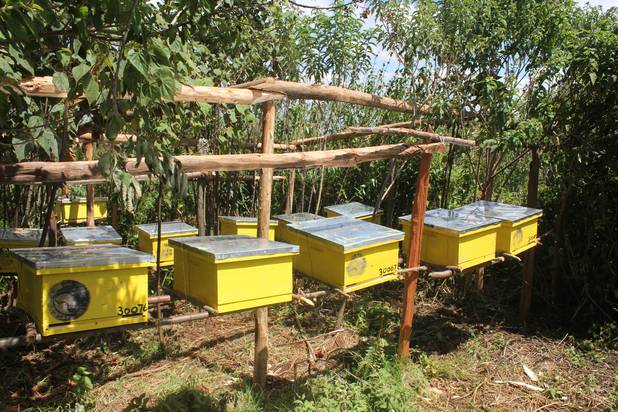Beekeepers can increase their honey yields by 100 fold by adopting the use of modern bee hives which allow the bees to build honeycomb into frames enabling them to be moved with ease.
Kimosop Kibet, an Ogiek bee keeper farmer from Elburgon, Nakuru County for instance, has increased his honey harvests from seven kilograms to 800 kilograms after investing in 40 modern Langstroth bee hives.
Related content
Bees create sweet times for semi arid area farmer
Eldoret farmer creates buzz in market with stingless bees
Know and protect bees to improve crop yields
The Langstroth bee hives have frames that are designed to prevent bees from attaching honeycombs and therefore enable easy management. In this, the Ogiek farmer who hitherto is a crop and livestock farmer has since increased his earnings to Sh400, 000 per harvest in a season up from Sh1050.
The Ogieks have for a long time been relying on the wild to keep bees and sustain their livelihoods. But times have changed. The Mau Forest, which has been Ogiek’s traditional habitat, has been invaded by other communities. The invasion has depleted the forests resources including the habitat for bees. This greatly destabilized Kimosop and other traditional bee keepers in his area who depended on selling honey to sustain their livelihoods.
“After visiting Baraka Agricultural College 2015, I was trained on improved hives which in turn would improve productivity as well as quality of my honey. I soon felt empowered after the trainings and decided to invest in the modern hives. The honey enterprise supports my family expenses and I am able to save some for other investments,” said Kimosop.
The college produces improved Kenya top bar and Langstroth hives. They also have a processing unit which they use to train farmers on the production of quality honey and honey products.
Kimosop and other 39 members from his community were trained on apiary management, honey harvesting techniques, marketing and market linkages. Other issues emphasized included apiculture as a business, business planning, honey processing, honeybee botany and forage establishment, environmental conservation, marketing strategies, product diversification of bee products and co-operative management.
In mid-2015, he bought Langstroth bee hives from Nakuru town at a cost of Sh1500 each. Langstroth bee hives allow bees to build honey into frames, which can be moved with ease. The frames in the hive are designed to prevent bees from attaching honey combs meaning Kimosop extracts each individual comb without destroying them. Initially, he used to harvest honey by smoking the traditional bee hive but this method proved inefficient as it drove bees away and affected the quality of the honey.
Kimosop in collaboration with other bee farmers in the area have opened a business outlet in Mariashoni, in Elburgon division of Molo. The outlet serves as a honey collection center as well as an outlet for local and regional markets, including Nairobi. They sell a kilogram of honey at Sh500.

















Comments powered by CComment